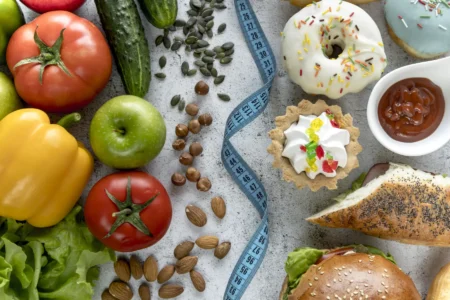 Everyone talks about eating healthy, but “balanced diet” often sounds like a vague idea — something you know you should do but aren’t sure how. In reality, balance isn’t about strict rules or giving up your favorite meals. It’s about feeding your body in a way that keeps your energy steady, your mood stable, and your mind clear.
Everyone talks about eating healthy, but “balanced diet” often sounds like a vague idea — something you know you should do but aren’t sure how. In reality, balance isn’t about strict rules or giving up your favorite meals. It’s about feeding your body in a way that keeps your energy steady, your mood stable, and your mind clear.
Food as Daily Fuel
Your body runs on what you give it. Every meal is like a small investment in how you’ll feel a few hours later. When the balance is right, you wake up easier, think faster, and stay full longer. When it’s off, you feel tired, distracted, or crave snacks all day.
A balanced diet includes all the major nutrients — carbohydrates, proteins, and fats — in proportions that work together. Carbs give quick energy, protein builds and repairs, and fats support your hormones and brain. Removing one completely throws the system off. It’s not about eating less; it’s about eating smart.
How Balance Feels in Real Life
You know your diet is working when you stop thinking about food all the time. Your body feels satisfied instead of stuffed. You can go a few hours between meals without getting shaky or irritable. You have the focus to finish your day without caffeine overload.
Real balance doesn’t mean counting every calorie. It’s more about variety — mixing colors, textures, and food types. A colorful plate usually means you’re getting a range of vitamins and minerals. Fresh fruit, vegetables, grains, and proteins each bring something different to the table.
Eating slowly helps too. When you take your time, your body has a chance to recognize that it’s full. You enjoy the taste instead of rushing through it. That awareness changes how you relate to food — from a routine task to something that genuinely supports you.
The Problem with Extremes
Modern diets love extremes. One day carbs are the enemy, the next day fat is. Quick-fix trends promise fast results, but they usually leave you tired or frustrated. Real nutrition doesn’t work that way. Your body isn’t a machine that reacts instantly to every bite. It’s a long-term system that needs steady input to perform well.
Cutting out entire food groups often creates more harm than good. For example, avoiding all carbs might make you lose weight fast, but it also drains your energy and affects your concentration. Balance means flexibility — knowing when to enjoy, when to hold back, and when to adjust.
Building Habits That Last
Healthy eating becomes easier when you stop chasing perfection. It’s not about one perfect meal; it’s about patterns over time. Even small improvements — a bit more water, one extra vegetable, less sugar in your coffee — make a difference.
The goal isn’t to eat like a nutrition textbook but to understand what works for you. Some people feel best with three main meals a day; others prefer smaller, more frequent ones. What matters most is consistency. When your routine fits your lifestyle, it stops feeling like an effort.
The Bottom Line
A balanced diet is less about rules and more about rhythm. It’s the steady pace that lets your body perform without constant highs and lows. You don’t need to chase perfect meals or punish yourself for bad days. Focus on balance, variety, and awareness — and the rest naturally falls into place.
Healthy eating isn’t about control; it’s about harmony. When you get that right, food stops being a challenge and becomes one of the simplest joys of daily life.
Picture Credit: Freepik
